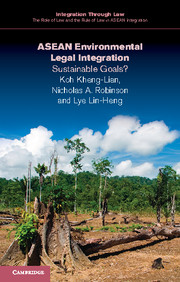Book contents
- Frontmatter
- Contents
- List of tables
- General editors’ preface
- Foreword – Professor Tommy
- Acknowledgments
- Introduction: exploring environmental law in Southeast Asia
- 1 ASEAN and environmental sustainability
- 2 Integrating sustainability into ASEAN state practice
- 3 The environment in the ASEAN region
- 4 Environmental sustainability laws in the ASEAN member states
- 5 ASEAN collaboration towards environmental sustainability
- 6 ASEAN and climate disruption
- 7 Conclusions: ASEAN's challenging way forward
- Executive summary
- Appendix A ASEAN organizational structure relevant to the environment – the ASEAN Charter
- Appendix B Founding of ASEAN – a short history
- Index
2 - Integrating sustainability into ASEAN state practice
Published online by Cambridge University Press: 05 April 2016
- Frontmatter
- Contents
- List of tables
- General editors’ preface
- Foreword – Professor Tommy
- Acknowledgments
- Introduction: exploring environmental law in Southeast Asia
- 1 ASEAN and environmental sustainability
- 2 Integrating sustainability into ASEAN state practice
- 3 The environment in the ASEAN region
- 4 Environmental sustainability laws in the ASEAN member states
- 5 ASEAN collaboration towards environmental sustainability
- 6 ASEAN and climate disruption
- 7 Conclusions: ASEAN's challenging way forward
- Executive summary
- Appendix A ASEAN organizational structure relevant to the environment – the ASEAN Charter
- Appendix B Founding of ASEAN – a short history
- Index
Summary
ASEAN is not only a well-functioning indispensable reality in the region. It is a real force to be reckoned with far beyond the region. It is also a trusted partner of the United Nations in the field of development.
Kofi Annan, former Secretary-General of the United Nations (February 16, 2000)Since the United Nations General Assembly accepted the Report from the World Commission on Environment and Development, entitled Our Common Future (1987), environmentally sustainable development has evolved to become a central theme for ASEAN. The documentation of this evolutionary progress appears in ASEAN Environmental Law, Policy and Governance: Selected Documents compiled by Koh Kheng-Lian. This body of state practice is substantial. The key measures that illustrate patterns of integration through law (ITL) have been usefully analyzed and collected into two readily available compendia – the first volume, Part I, “Setting the Stage for ASEAN Environmental Cooperation, Harmonization, and Integration” and Part II, “General Legal Frameworks on the Environment,” which contains ASEAN documents on environmental law. These environmental legal instruments appear not only in the ASEAN Socio-Cultural Community Blueprint (also known as the Third Pillar) but across the ASEAN Political Security Community Blueprint (also known as the First Pillar). Volume I also includes documents setting forth ASEAN's environmental Programmes, Strategies, Plans of Action and Blueprints, as well as Declarations, Resolutions and Accords. The second volume focuses on specific sectors such as terrestrial ecosystems – natural resources and biodiversity; coastal and marine environment; water resources management; health and environment; energy and climate change; disaster management; environmental education; and ASEAN environmental governance. Both volumes should be considered companions to the commentaries in this monograph.
It is beyond the scope of this study to address each of the many ASEAN environmental decision-making processes that constitute environmental law, policy and governance in ASEAN. This monograph will selectively reference ASEAN decision-making documents where relevant to an analysis of the rule of law in ASEAN integration, from an environmental law perspective. It should be noted that not all areas that need environmental integration are as yet amenable to integration for reasons of politics, sensitivity of issues, lack of knowledge and capacity, or other reasons.
Evaluating how environmental law functions in the context of ASEAN “integration” can be challenging because the realm of the environment is all encompassing.
- Type
- Chapter
- Information
- ASEAN Environmental Legal IntegrationSustainable Goals?, pp. 27 - 36Publisher: Cambridge University PressPrint publication year: 2016

